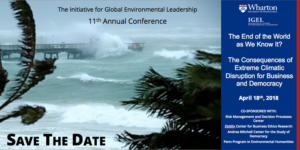
NEWS RELEASE
DURHAM, North Carolina—Feb. 26, 2018
Risks related to climate change are some of the most significant threats facing the global economy, according to the World Economic Forum, which recently released its Global Risks Report 2018. In a report that scans a spectrum of economic, environmental, geopolitical, societal, and technological risks, extreme weather events, natural disasters, and failure to mitigate climate change took three of the Top 5 risks likely to have an impact on the global economy in the short term.
Business schools are taking notice. “Virtually every industry will be affected by climate change in the future in some way,” says Daniel Vermeer, PhD, associate professor of the practice at Duke University’s Fuqua School of Business. “Climate change will shift what agricultural products can be grown where. Extreme weather events will disrupt distribution supply chains more frequently. Energy and transportation infrastructure will need to be more resilient. Real estate portfolios need to be reconfigured. If you’re a business school student today, you need to be thinking ahead about where the future risks are.”
 Fuqua is one of 16 business schools collaborating to host an event on March 23-24 called ClimateCAP: The Global MBA Summit on Climate, Capital, & Business. Its speakers will include executives from JPMorgan Chase, Goldman Sachs, Nike, Bain & Co., Morgan Stanley, Levi Strauss, KPMG, and other big-name private sector leaders. The summit will be held on Fuqua’s campus in Durham, NC, but will rotate to another business school in future years.
Fuqua is one of 16 business schools collaborating to host an event on March 23-24 called ClimateCAP: The Global MBA Summit on Climate, Capital, & Business. Its speakers will include executives from JPMorgan Chase, Goldman Sachs, Nike, Bain & Co., Morgan Stanley, Levi Strauss, KPMG, and other big-name private sector leaders. The summit will be held on Fuqua’s campus in Durham, NC, but will rotate to another business school in future years.
“This summit is not about politics. It’s not about policy. It’s about which businesses and investors will successfully navigate a more turbulent future because they’ve identified these risks and adapted accordingly—and which will be left flat-footed,” adds Vermeer.
Statoil, the Norwegian oil and gas company, is one example of a company that’s not shying away from recognizing the risks on the horizon. “In Statoil we believe the winners in the energy transition will be the producers that can deliver energy at low cost and low carbon. That is why we work to reduce own emissions, grow in renewables and embed climate in all our decision-making,” says Bjørn Otto Sverdrup, Senior Vice President of Sustainability at Statoil. Sverdrup will be speaking at the summit and hopes to help MBA students better understand the profound strategic challenges and opportunities climate issues represent for companies.
 ClimateCAP is not the only climate-related conference to be hosted at a business school this year. In February, the University of Virginia’s Darden School of Business hosted an innovation summit to bring corporate leaders and entrepreneurs together with faculty, students, and think tank experts to recommend strategies that inspire innovation to tackle climate change. And in April, the University of Pennsylvania’s prestigious Wharton School will host an event called “The End of the World as We Know It? The Consequences of Extreme Climatic Disruption for Business and Democracy.”
ClimateCAP is not the only climate-related conference to be hosted at a business school this year. In February, the University of Virginia’s Darden School of Business hosted an innovation summit to bring corporate leaders and entrepreneurs together with faculty, students, and think tank experts to recommend strategies that inspire innovation to tackle climate change. And in April, the University of Pennsylvania’s prestigious Wharton School will host an event called “The End of the World as We Know It? The Consequences of Extreme Climatic Disruption for Business and Democracy.”
“It is critical that we empower the next generation with strategic knowledge tools in business and sustainability so that they can lead us into a future with fewer climate change challenges,” says Joanne Spigonardo, senior associate director of Wharton’s Initiative for Global Environmental Leadership. “Business schools can be catalysts to innovate those changes so that we can ensure a world of economic and environmental sustainability.”
In 2017, Columbia Business School organized an event on “The Near-Term Impacts of Climate Change on Investors” and Yale School of Management also co-hosted a conference on climate change.
“I have no doubt that we’ll see more of these conversations happening at business schools in the future.” says Vermeer. “The reality is, MBA students can’t afford to ignore the impacts and implications of a changing climate. There will be winners and losers, and many opportunities to seize competitive advantage. As current MBAs prepare for their careers, they need to be thinking about how to creatively respond to the strategic, operational, and innovation challenges of climate change that will inevitably grow in coming decades.”
—
FOR ADDITIONAL INFORMATION:
Fuqua School of Business – Dan Vermeer, PhD, Executive Director, Center for Energy, Development, and the Global Environment and Associate Professor of the Practice,
Wharton School – Joanne Spigonardo, Senior Associate Director, Initiative for Global Environmental Leadership (IGEL), The Wharton School, University of Pennsylvania
—
RELATED ARTICLES:
- Video: Katherine Neebe, Director of Sustainability, shares Walmart’s take on climate change & business value
- Video: Statoil Energy Ventures’ Gareth Burns discusses investing in renewables
- Dan Vermeer discusses business response to climate change